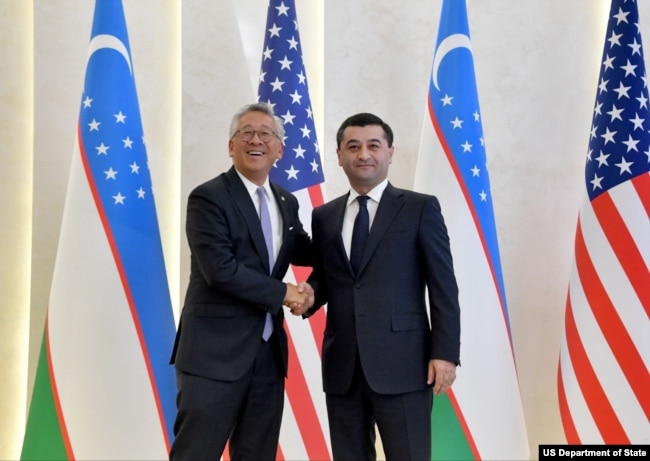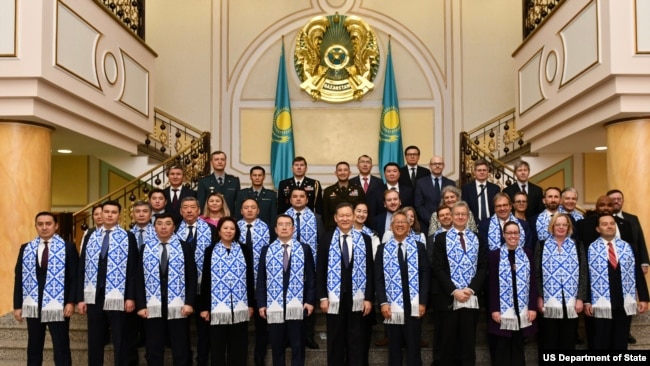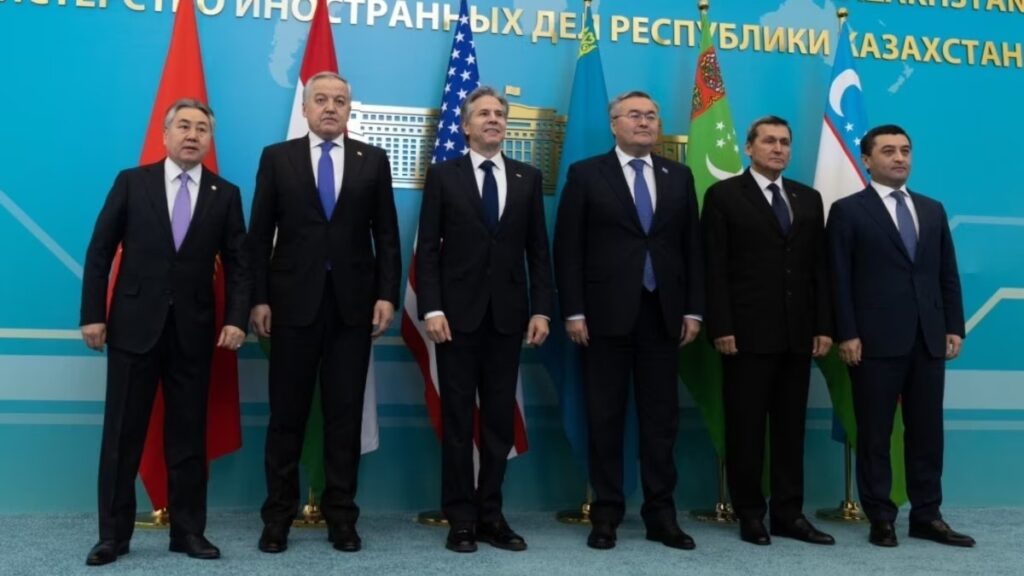Concerns about slow progress on political and economic reforms appear to have done little to dampen the atmosphere during talks this week between a U.S. delegation and government officials in Kazakhstan and Uzbekistan.
“The United States reaffirmed its unwavering support for Uzbekistan’s independence, sovereignty, and territorial integrity,” said a U.S. State Department statement on the November 6-7 talks, which were led on the American side by Donald Lu, the assistant secretary for South and Central Asian Affairs.
The discussions in both Astana and Tashkent focused on political, economic, security, human rights, and cultural dimensions, the department said. It quoted Lu expressing Washington’s gratitude to the presidents of both countries for their “active engagement” within the “C5+1” diplomatic platform in which the five Central Asian republics (the C5) and the U.S. hold periodic talks.

Human rights advocates regularly criticize the governments of both countries for their failure to allow real political opposition or tolerate dissent. However, the two are key players in a region where the U.S. sees an opportunity to increase its influence amid growing distrust of Russia after its unprovoked invasion of Ukraine.
The energy-rich region also figures in the global competition for influence between the United States and China. Kazakhstan is the largest economy in the region, while Uzbekistan is the most populous, with median age under 30 in both countries.
Countries partner with U.S.
In the more than three decades since the breakup of the Soviet Union, Kazakhstan and Uzbekistan have cemented themselves as strategic partners of the United States, supporting the 20-year U.S. campaign in Afghanistan and cooperating on counterterrorism operations, non-proliferation initiatives and other common goals.
Kairat Umarov, Kazakhstan’s first deputy foreign minister, stressed during the talks in Astana that his country is in an “enhanced strategic dialogue” with Washington with open channels of communication, aiming to boost trade and investment, specifically in energy and technology.
Kazakh and U.S. officials also emphasize ongoing consultations on U.S.-led sanctions against Russia, Kazakhstan’s northern neighbor, that were imposed after its invasion of Ukraine.
Washington wants Astana to speed up systemic reforms, which President Kassym-Jomart Tokayev claims are a top priority. Umarov “underscored Kazakhstan’s commitment to fully implement” that program, and Lu reiterated Washington’s strong support, according to the U.S. State Department statement.
Media freedom and civil society issues are always part of the dialogue, say U.S. officials, adding that they want to increase educational exchanges.
Similar assurances were offered in the U.S.-Uzbek strategic partnership session. While Uzbekistan is counting on Washington’s assistance in joining the World Trade Organization, the U.S. wants to work closely with Tashkent on regional connectivity and security.
This week’s discussions focused on defense, law enforcement, border and customs cooperation, the State Department said.
A joint statement following the talks said the United States and Uzbekistan share “a desire to continue to grow and diversify trade and investment, advance agricultural reforms in Uzbekistan, improve women’s economic empowerment, and jointly address the climate crisis.”

Economic and political reforms remain problematic in Uzbekistan, where advocates argue that progress on expansive promises made by President Shavkat Mirziyoyev since taking office in 2016, has stalled or moved backward in recent years.
But Deputy Foreign Minister Gayrat Fozilov told the U.S. delegation his country is committed “to continue irreversible democratic reforms … promoting respect for human rights, including freedom of religion or belief, combating trafficking in persons and corruption, and preventing gender-based violence.”
To demonstrate U.S. support for women’s empowerment, Lu played hockey in Astana with young female athletes. In Uzbekistan, he met with Mirziyoyev’s closest aide, his eldest daughter Saida Mirziyoyeva.
“We discussed the current state and prospects of bilateral relations between our countries in education, culture, and ensuring the rights of women and children. We also exchanged views on issues of supporting the media and civil society in Uzbekistan and interaction in the field of human rights,” said Mirziyoyeva via social media.
Source: VOA


